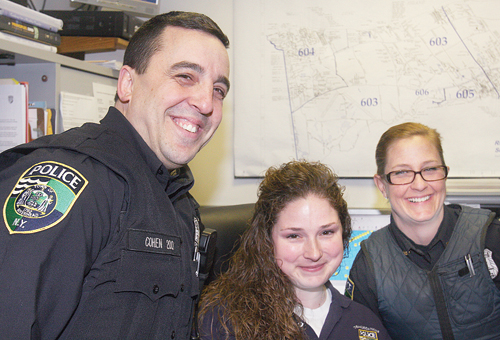Riverhead police officers save unconscious boy

In a span of just a few minutes, a smooth, swift response by a Riverhead police dispatcher and two officers may have been crucial to saving the life of a 15-month-old boy Saturday afternoon.
Led by dispatcher Melissa Elco, the trio coordinated a flawless response that required split-second decisions to help save Chase Kwasna, who was unconscious after suffering a seizure.
The call came in to Ms. Elco at 3:43 p.m. from the boy’s mother, Leslie Kwasna, who lives just off Osborn Avenue with her husband, Jason, and their four children.
While his wife was doing laundry, Mr. Kwasna was rocking his 3-year-old son, Tatum, to sleep. At that point, their 4-year-old daughter, Jordyn, came running into the room, saying that Chase “just fell down shaking,” Mr. Kwasna said Wednesday.
Ms. Elco calmly sprang into action as the call came in, coordinating the response from officers and EMTs while guiding Ms. Kwasna through the appropriate actions.
“She indicated that he was unconscious, that he was struggling to breathe,” Ms. Elco said. “She thought he was choking on a toy of some kind. So I had her flip the baby over to start doing back thrusts, which her husband was doing and doing very well.”
Mr. Kwasna jammed his hand in his son’s mouth, pulling out his tongue to try to clear any object that might have been blocking his airway. Four days later, a bite mark on the father’s left hand near his thumb was still visible from where Chase had bitten down.
Chase still wasn’t breathing as the first officer arrived on scene.
Mr. Kwasna rushed Chase outside to the front lawn where officer Kerri Davis immediately began performing CPR. A few moments later, officer Eric Cohen arrived.
Ms. Davis said the information she received from the dispatcher was vital. The CPR procedure for a baby up to 12 months differs from the procedure for a slightly older child, like Chase.
The officers were on scene about three minutes after the initial call, Ms. Elco said. “It felt like hours,” Mr. Kwasna said.
As Mr. Cohen arrived, they faced a decision: wait for the ambulance or transport immediately in the patrol car.
“I made the call that we would go ahead and let’s go,” Mr. Cohen said. “We’re going to put him in the back of my car and we’re just going to go ahead and transport.”
As Mr. Cohen got behind the wheel, lights and siren blaring, Ms. Davis continued to assist the boy from the back seat, with his mother seated next to her. They passed the ambulance on the way as snow began to fall.
“It’s not easy,” Ms. Davis said of performing CPR in the car. “We were fortunate that when we got in the car, shortly thereafter, he started making noise. So it wasn’t CPR the entire ride. We were still under the impression he was choking, so any type of airway exchange is positive.”
Mr. Cohen said it’s a rare case where the officers elect to transport a victim immediately rather than wait for an ambulance. But since they were both trained in the life-saving procedure, it made sense to get rolling and not waste any time, Mr. Cohen said.
As the officers rushed the boy in the patrol car, Ms. Elco alerted Peconic Bay Medical Center to prepare for their arrival.
“We called the emergency room and told them that we had a choking, unresponsive 15-month-old coming in so that they were prepared, and the officers told us when they were en route and told us when they were at the scene in the ER,” said Ms. Elco, who has been a dispatcher for seven years.
The drive to the hospital was only about a mile and a half, Mr. Cohen said.
“Our dispatchers are great,” Mr. Cohen said. “We got the initial call from [Ms. Elco] and she had great information, thorough, and kept us advised of what was going on. She was a big part of it.”
Chase began to regain consciousness as they pulled up to the hospital. The officers ran inside and put him on a bed and within seconds he was screaming, said Ms. Davis, a 20-year veteran of the police force.
“I send most of my credit to officer Davis and the dispatcher,” said Mr. Cohen, who’s been a Riverhead cop for six years and is also a Wading River firefighter.
At around 9 p.m. Chase was transported to Stony Brook University Medical Center, his father said. The next morning doctors performed an electroencephalogram to measure Chase’s brain waves. The test lasted about four hours, Mr. Kwasna said.
“We held him down and he was fighting it,” Mr. Kwasna said. “He just got so tired he fell asleep. So he slept for like 2 1/2 hours of the testing, which was perfect for the doctor.”
Doctors couldn’t determine what caused the seizure, even calling Chase “a picture of health,” Mr. Kwasna said.
“They can’t figure out what’s wrong, and that’s what bothers them,” he said. “He should not have had a seizure.”
Chase will undergo an MRI next week at Stony Brook, his father said.
The moment wasn’t lost on Mr. Cohen, who said he knew the boy’s life was in their hands during those tense minutes. To have it end well was a special moment.
“It’s not an everyday call,” he said. “Dealing with an infant, it’s more heightened, more of an alert call.”
After the situation calmed down at the hospital and Chase appeared to be OK, Ms. Davis went to find out the boy’s last name for her report. It wasn’t until that moment she realized she actually knew the parents.
“I have never had tunnel vision in my life like that,” Ms. Davis said.
Editor’s Note: This version of the story appeared in the print edition of the News-Review Feb. 21. The original story was posted Feb. 16.









